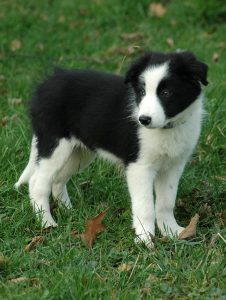When considering a new pet, many owners’ top concerns revolve around grooming. Questions such as ‘how often do I need to brush my pet’ and ‘will my pet shed a lot’ aren’t uncommon.
However, certain breeds seem to raise more concern about shedding due to their full, thick coats, and border collies are no exception.
According to the American Kennel Club, border collies rank 35 out of 193, making them an extremely popular breed of dog. They’re known for their bold leadership skills and unmatched intelligence.
Originally bred as shepherding dogs, border collies are agile and energetic, and many owners prefer to use this energy for agility competitions.
If competitions aren’t your goal, they also enjoy playing in the yard – whether it be a long game of fetch or a DIY agility course.
Whichever way you go, it is important to give them more than a bathroom walk around the block.
The border collie’s charismatic and energetic personality isn’t a new occurrence, however; as these intelligent dogs have been around for centuries.
Border Collie History
 Like many great things in modern society, border collies can trace their origins to hundreds of years ago to the Roman Empire.
Like many great things in modern society, border collies can trace their origins to hundreds of years ago to the Roman Empire.
When the Roman Empire occupied Britain – around the year 43 – livestock became an especially important part of the Roman lifestyle, and with livestock comes dogs.
The Roman herding dogs were large and stocky – nothing like the modern day border collie which is sleek and agile.
It wasn’t until a few centuries later, when Rome began to retreat from Britain and the Vikings introduced their small, quick herding dogs that we begin to see a breed similar to the border collie arise from breeding occurring between the Roman sheepdogs and the Nordic sheepdogs.
The border collie, which was officially inducted into the American Kennel Club’s Herding Group in 1995, continued to flourish in the British islands and around the world where it is beloved for its physical abilities, its bright and sagacious personality, and, of course, its signature thick, monochromatic coat.
What is a Border Collie’s Coat Like?
Border collies have two main coat variety types. Both coats share some similar qualities, however, that make them fit for a working breed, such as being close-fit, dense, and weather resistant.
The first variety, known as the rough variety, is of medium length with feathering towards the extremities and smooth on the face and front of legs.
The smooth variety is short over the entire body, with little feathering. It also has more texture than the rough variety. Neither variety is preferred over the other, and both shed.
Are Border Collies Hypoallergenic?
Sadly, border collies are not hypoallergenic. In fact, there are no dog breeds that hypoallergenic – though you may find some that cause less allergy symptoms than others.
While border collies aren’t hypoallergenic, if you do suffer from allergies and would still like to keep one, there are a few things you can do.
First, spend time with your collie outside. Play with them and groom them outside so that most of their dander is removed outside and not in your home to be breathed in.
Also make sure to wash and groom you border collie often to help prevent shedding and dander. You can also invest in air purifiers designed specifically from removing pet dander from the air.
Do Border Collies Shed?
The short answer is, yes, border collies do shed.
How Much do Border Collies Shed?
The long answer is that border collies experience both regular and seasonal shedding.
The American Kennel Club suggests brushing two or three times a week to help reduce stray hair, but, due to the breed’s listing as a ‘seasonal shedder’ – neither frequent or infrequent – some shedding will always occur, especially during different times.
When do Border Collies Shed the Most?
 While border collies with their thick fur will always experience some degree of shedding, there are certain times of the year where their shedding is increased.
While border collies with their thick fur will always experience some degree of shedding, there are certain times of the year where their shedding is increased.
Time of Year
As seasonal shedders, you’ll find that your border collie experiences the most shedding during, well, shedding seasons.
During the late summer and fall, your collie’s coat will begin to thicken.
This means that they must first shed their summer coats, which are slightly thinner to keep them cool, and regrow a thicker, denser coat. This is the first shedding season.
Then, come spring, your collie will undergo another shedding season. Due to the fact that the spring season is when your border collie is shedding their thick winter coat, this season is more extreme than the fall season.
Puppy Coat
Spring isn’t the only time that border collies lose a thick coat! The anatomical similarity between humans and dogs is fascinating, and puppy coats are just another example of this.
When a human baby is born, they have a different skin anatomy than an adult. They have an excess of a tissue known as brown adipose tissue that helps keep them warm.
Border collie puppies are similar, though their extra insulation comes in the form of a thick, fluffy, lovable coat. Around six months to a year old, however, this coat will eventually shed so that their adult coat can come in.
Health Issues
While the first two causes of shedding are natural, there are some causes that aren’t.
Excessive shedding outside of shedding season or maturity can be an indication of an underlying health issue.
Poor Diets
Hair – whether in dogs or humans – can be a great indicator of health, especially in regard to diet.
Think, if a human is not eating right and is lacking vital vitamins and nutrients, their hair may appear dull and lack luster, breaking easily.
Dogs are no different. If your border collie does not have a diet that fulfills all of their needs, you will find that they may begin to shed excessively, just like a person.
If you find that your collie’s diet is the culprit in their bad hair days, you may want to consider adding in some hair-tastic foods.
Here are a few examples of puppy-friendly foods that will help your border collie have a strong, healthy coat:
- Egg yolk
- Beef
- Salmon
- Chicken
- Sardines (fresh)
- Tuna (canned)
Ticks, Fleas, and Other Pests and Parasites
 Dogs hate being irritated. If they have a flea or tick on them, they will scratch until they no longer feel irritated, and, if the infestation is extreme, they will never find relief.
Dogs hate being irritated. If they have a flea or tick on them, they will scratch until they no longer feel irritated, and, if the infestation is extreme, they will never find relief.
This means that your dog will scratch excessively, until the point that they, along with the parasites, cause inflammation and even hair loss.
If this goes for a period of time without treatment, your dog could suffer from health issues such as permanent hair loss, scabbing, and even life-threatening infections.
Make sure to treat your dog often for parasites, and, if an infestation is suspected, talk to your veterinarian for treatment options.
How to Combat Border Collie Shedding
Once you are sure that your border collie is shedding for natural reasons and there are no issues, you can begin combating the swarm of hair that occurs – especially in the thick of shedding season.
Regular washing and grooming are the best ways to ensure that your collie is not shedding excessively. Whatever you do, however, do not shave your border collie.
First, your collie relies on this coat for protection not only from the temperature but from harmful UV rays. Also, due to the fact that a collie’s coat is a double-coat, once you shave their fur, it will never grow back the same.
Equipment to Help Combat Border Collie Shedding
One of the best tools for combating border collie shedding is a pin brush.
Pin brushes are designed for denser coats and are able to efficiently remove dead skin and loose hair.
The head of the pin will also help stimulate blood flow and oil production, helping your border collie’s coat to be healthy and shiny.
Final Thoughts: Do Border Collies Shed?
 Border collies are an amazing breed with unmatched wit and agility. So long as you have the time and are willing to provide the care they need, they can provide you with 12 to 15 years of love, joy, and adventure.
Border collies are an amazing breed with unmatched wit and agility. So long as you have the time and are willing to provide the care they need, they can provide you with 12 to 15 years of love, joy, and adventure.
First, due to their natural instincts and history of acting as herders for livestock, border collies will need more than a walk around the block or a quick romp in the yard to keep them happy.
If you’re considering adopting one into your family, plan to spend a lot of time playing fetch or running your dog.
There are also some things to take into consideration in regards to the border collie’s iconic coat.
First, border collies, like all dogs, are not hypoallergenic, and, due to the fact that they are seasonal shedders, they will require regular grooming.
Investing in the right equipment can help tremendously with this task.
However, despite the fact that border collies need a little extra care compared to some other breeds, they are still an amazing breed to consider bringing into your family.

